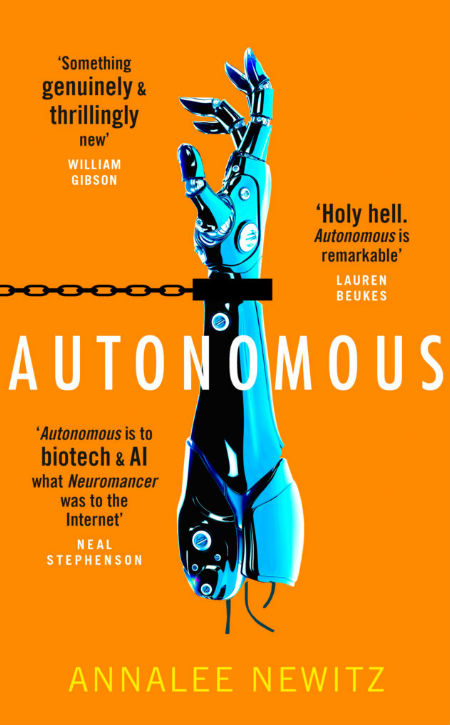
Unfettered modern capitalism, whatever your view of it, and for most people, billionaires and power brokers aside, it’s not a favourable one, is having quite the heyday of late.
Governments regularly spruik its multitudinous benefits, throwing around words like “efficiency” and “market-driven” like their confetti at a neverending, privately-funded market-driven parade.
So robust is the adherence by most modern governments to the hallowed, almost religious tenets of Thatcherite free-market capitalism, that little by little, everything has come to have a value.
Everything from free time to the work of housewives to the natural enviroment and various other lifegiving intangibles have come to be given values, as if the only validation of inherent worth is an assigned dollar amount.
In Annalee Newitz’s startlingly-accomplished and mesmerisingly-intelligent debut novel, Autonomous, this dynamic has reached its zenith, or nadir depending on your philosophical position, with everything in a radically-corporatised mid-twenty second century world having a value of some kind.
Taking that position to its ultimate endpoint, life itself now has a value based almost solely on a person’s value to society – it’s not such a far-fetched idea; see what China has in mind for its citizens – with slavery, or rather voluntary indenturing now back in vogue among the world’s capitalist elite.
“Jack hadn’t had to kill anyone for a long time. Usually, in a tight situation, she wasn’t in the middle of the ocean. She could run away instead of having to fight. She ran a hand through the salt-stiffened tufts of her hair, wanting to vomit or cry or give up again in the face of the hopeless, endless pharma deprivation death machine.” (P. 17)
Propelled by the idea that the various economic blocs of the world have had to invest significantly in technological advancement and must get due recompense – countries have long ceased to exist with entities like the Free Trade Zone (old USA/Canada/Mexico) and the Asian Union bestriding the map like a monetarily-driven colossus – the indenturing of robots for a minimum of ten years has spurred a rather warped idea that humans, usually poor ones of course, can choose to be indentured too.
It’s a glossy, PR-friendly way of describing slavery that seems to grant autonomy where there really is none, and it ignores the fact that the poor have little to no rights, the middle class, such as they are, have to be able to afford franchises which give them the right to live and work in a city, a state or farther afield depending on how deep their pockets are, to get ahead, and everything, and I mean everything, is standardised, corporatised and valued according to strict economic rationale.
It’s a mark of how well-written Autonomous is that this world-building feels incredibly real, well-informed and scrupulously-detailed, an unsettling outworking of dynamics that are already very much in play today.
There is nothing on the surface dystopian about the future – Newitz objectively presents it as a world in which people, well most people, accept that everything has a price, and they must work around it – with the populace at large making the best of things and treating the most outlandish of things as normal, much as they have always done.
That’s not to say everyone likes it; in fact many people don’t, with two of the main characters Jack and Threezed – he’s named after the last two digits of his numerical designation as a slave, sorry voluntarily indentured person – each fighting in their own way to grab back some control and restore some humanity to a worldwide system manifestly lacking in it on the whole.

It is easy to think it’s a losing battle with the likes of Eliasz and Paladin, human and robot agents of the International Property Office (IPO) of the African Federation – which remains as economically discriminated then as it is now with the Western nations continuing their dominance of the sunny side of the economic street – enforcing capitalist imperatives rather than old-fashioned notions of right or wrong.
There is a justice of sorts but it’s as cold, hard and unyielding as a balance sheet so when a productivity drug created by one of the big pharma, Zaxy, turns out to have some deadly addictive side effects, meaning that Jack, an idealistic scientist-turned-drug pirate determined to Robin Hood the balance in favour by reverse-engineering drugs and making them cheaply available, has been peddling death-inducing drugs, the IPO comes down hard and brutally in their pursuit of the criminal.
It’s not the deaths that bother them so much as the violation of corporate rights, and their idea of justice delivered involves far more death, torture and abrogation of every human right imaginable than our current judicial system would ever begin to contemplate sanctioning.
While Autonomous is far from being some ranty, empty-headed polemic, it does, indirectly at least via some judicious showing not telling, make a clear case for humanity over economics, illustrating how society is hollowed out by an adherence to money over all over things.
Humans, as always, are endlessly adaptable, and make the best of it as previously noted, but the old need for love, connection, value and freedom remain, with the itching need to have some choice in how your life plays out never quite going away.
“Jack remembered the next twenty-four hours as a series of violent, black-and-white still photographs, like the slides archivists pasted into old movies where footage had been lost.” (P. 204)
Autonomous then is a book for everyone who subscribes to the idea that you should never simply accept a state of being as immutable and unchangeable; in fact the dedication lives out this creed – “For all the robots who question their programming” and it is powerful and seductive, as it should be.
This doesn’t automatically presage a happy ending of course, and you could well argue that any triumph at the conclusion of the grippingly tense storyline is ameliorated by the preservation, despite the best efforts of Jack, Threezed and a number of other idealists of the status quo, but the ideas that percolate through the book, and are expressed with deliciously poetic prose that is as beautiful as the ideals that drive the narrative, reign supreme, provoking much rumination for any one who can’t accept that we rise and fall based on how much money we have in our possession.
What makes Autonomous so brilliant, apart from its superlative writing, rich and vibrant characterisation and taut, engaging narrative, is that its many, many ideas are so cleverly woven into the fabric of the book.
Want to get someone to cease being a sheep and think again about the rules and regimes that govern their life? Hand them Newitz’s immensely-enjoyable, evocatively-delivered debut which proves you can have your full-speed ahead plot and pause to think things through too.
Maybe if more of us listened to its expertly and well-delivered message, the future described in Autonomous, one in which corporations rule and humanity is lost among shareholdings and patents, may just be avoidable, a heartening result for any of us who give a damn about what it really means to be human.
One thought on “Book review: Autonomous by Annalee Newitz”
Comments are closed.